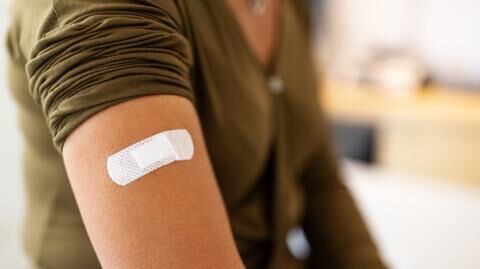A COVID immune therapy treatment derived from llamas has shown 'significant potential' in early trials. Public Health England labelled it as one of the 'most effective SARS-CoV-neutralising agents' tested so far and having 'significant potential for both the prevention and treatment of COVID-19.'
Discover our latest podcast
The treatment is created using nanobodies - smaller and simpler alternatives to antibodies - naturally produced in llamas and camels in response to infection. The paper, published in Nature Communications, explains that due to their size, nanobodies could be useful in nasal spray vaccines:
The small molecular size and stability of nanobodies allows them to be formulated for topical delivery directly to the airways of infected patients through aerosolisation. This results in improved bioavailability, simpler therapeutic compliance and easier administration.

Llama-based COVID treatment results in successful animal trials
Professor James Naismith, one of the lead researchers and director of the Rosalind Franklin Institute in Oxfordshire, spoke to BBC News about the nanobody-based treatment, explaining that rodents that were infected with COVID-19 and then given the nanobody nasal spray had made a full recovery within six days.
Trials also showed that the nanobody treatment was able to neutralise not only the original COVID-19 strain but also that of the Alpha and Beta variants.
The treatment has only been tested in lab animals so far, but early results already have researchers excited. Professor Sheena Cruickshank, an immunologist from the University of Manchester, told BBC News:
We need more data on efficacy and safety before we move to human trials. However, it’s very promising nonetheless, and the fact it may be cheaper and easier to administer is a plus. COVID-19 will be, unfortunately, with us for a while yet, so more treatments will be needed.
How would llama COVID treatments work?
The efficacy of the treatment comes from the strength in which nanobodies bind to the virus, flagging it as a target for the rest of the immune system to tackle. Nanobodies that the researchers used in their trials, developed with the help of a llama named Fifi, bind particularly tightly to coronavirus.
Researchers extracted the nanobodies from Fifi by giving her a vaccine containing a small piece of the viral protein. Researcher's then removed, purified, and combined them into chains of three to create the most potent COVID neutralising nanobodies, which were then able to be reproduced in a lab.
Professor Ray Owens, head of protein production at the Rosalind Franklin Institute and lead author of the research, revealed in a press release:
Nanobodies have a number of advantages over human antibodies. They are cheaper to produce and can be delivered directly to the airways through a nebuliser or nasal spray, so can be self-administered at home rather than needing an injection. This could have benefits in terms of ease of use by patients but it also gets the treatment directly to the site of infection in the respiratory tract.
Professor Naismith also spoke in the press release, explaining that nasal spray nanobody treatments could potentially prove effective in the face of waning immunity and for those that don't generate an immune response from vaccines:
While vaccines have proven extraordinarily successful, not everyone responds to vaccination and immunity can wane in individuals at different times. Having medications that can treat the virus is still going to be very important, particularly as not all of the world is being vaccinated at the same speed and there remains a risk of new variants capable of bypassing vaccine immunity emerging.















